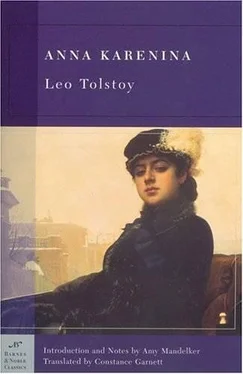As he listened to his brother's argument with the professor, he noticed that they connected these scientific questions with those spiritual problems- that at times they almost touched on the latter; but every time they were close upon what seemed to him the chief point they promptly beat a hasty retreat, and plunged again into a sea of subtle distinctions, reservations, quotations, allusions and appeals to authorities, and it was with difficulty that he understood what they were talking about.
"I cannot admit it," said Sergei Ivanovich, with his habitual clearness and distinctness of expression, and elegance of diction. "I cannot in any case agree with Keiss that my whole conception of the external world has been derived from impressions. The most fundamental idea- the idea of existence- has not been received by me through sensation; indeed, there is no special sense organ for the transmission of such an idea."
"Yes, but they- Wurst, and Knaust, and Pripassov- would answer that your consciousness of existence is derived from the conjunction of all your sensations, that that consciousness of existence is the result of your sensations. Wurst, indeed, says plainly that, assuming there are no sensations, it follows that there is no idea of existence."
"I maintain the contrary," began Sergei Ivanovich.
But here it seemed again to Levin that, just as they were close upon the real point of the matter, they were again retreating, and he made up his mind to put a question to the professor.
"According to that, if my senses are annihilated, if my body is dead, I can have no existence of any sort?" he queried.
The professor, in annoyance, and, as it were, mental suffering at the interruption, looked round at the strange inquirer, more like a hauler of a barge than a philosopher, and turned his eyes upon Sergei Ivanovich, as though to ask: What's one to say to him? But Sergei Ivanovich, who had been talking with far less stress and one-sidedness than the professor, and who had sufficient breadth of mind to answer the professor, and at the same time to comprehend the simple and natural point of view from which the question was put, smiled and said:
"That question we have no right to answer as yet…"
"We have not the requisite data," confirmed the professor, and he went back to his argument. "No," he said; "I would point out the fact that if, as Pripassov directly asserts, sensation is based on impression, then we are bound to distinguish sharply between these two conceptions."
Levin listened no more, and simply waited for the professor to go.
When the professor had gone, Sergei Ivanovich turned to his brother.
"Delighted that you've come. For how long? How's your farming getting on?"
Levin knew that his elder brother took little interest in farming, and only put the question in deference to him, and therefore he told him only about the sale of his wheat and money matters.
Levin had meant to tell his brother of his determination to get married, and to ask his advice; he had indeed firmly resolved to do so. But after seeing his brother, listening to his conversation with the professor, hearing afterward the unconsciously patronizing tone in which his brother questioned him about agricultural matters (their mother's property had not been divided, and Levin took charge of both their shares), Levin felt that he could not for some reason broach to him his intention of marrying. He felt that his brother would not look on it as he would have wished him.
"Well, how is your Zemstvo doing?" asked Sergei Ivanovich, who was greatly interested in Zemstvo establishments and attached great importance to them.
"I really don't know."
"What! But surely, you're a member of the board?"
"No, I'm not a member now; I've resigned," answered Levin, "and I no longer attend the sessions."
"What a pity!" commented Sergei Ivanovich, frowning.
Levin in self-defense began to describe what took place at the sessions in his district.
"That's how it always is!" Sergei Ivanovich interrupted him. "We Russians are always like that. Perhaps it's our strong point, really- this faculty of seeing our own shortcomings; but we overdo it, we comfort ourselves with irony, which we always have on the tip of our tongues. All I say is, give such rights as our Zemstvo establishments to any other European people, and… Why, the Germans or the English would have worked their way to freedom with them, while we simply turn them into ridicule."
"But how can it be helped?" said Levin penitently. "It was my last trial. And I did try with all my soul. I can't. I'm no good at it."
"It's not that you're no good at it," said Sergei Ivanovich, "it is that you don't look at it as you should."
"Perhaps not," Levin answered dejectedly.
"Oh! do you know brother Nikolai's turned up again?"
This brother Nikolai was the elder brother of Constantin Levin, and half-brother of Sergei Ivanovich; a man who was done for, who had dissipated the greater part of his fortune, was living in the strangest and lowest company, and had quarreled with his brothers.
"What did you say?" Levin cried with horror. "How do you know?"
"Procophii saw him in the street."
"Here in Moscow? Where is he? Do you know?" Levin got up from his chair, as though on the point of starting off at once.
"I'm sorry I told you," said Sergei Ivanovich, shaking his head at his younger brother's excitement. "I sent to find out where he is living, and sent him his I O U to Trubin, which I paid. This is the answer he sent me."
And Sergei Ivanovich took a note from under a paperweight and handed it to his brother.
Levin read in the queer, familiar handwriting: "I humbly beg you to leave me in peace. That's the only favor I ask of my gracious brothers.- Nikolai Levin."
Levin read it, and without raising his head stood with the note in his hands opposite Sergei Ivanovich.
There was a struggle in his heart between the desire to forget his unhappy brother for the time, and the consciousness that it would be base to do so.
"He obviously wants to offend me," pursued Sergei Ivanovich; "but he cannot offend me, and I should have wished with all my heart to assist him, but I know it's impossible to do that."
"Yes, yes," repeated Levin. "I understand and appreciate your attitude to him; but I shall go and see him."
"If you want to, do; but I shouldn't advise it," said Sergei Ivanovich. "As regards myself, I have no fear of your doing so; he will not make you quarrel with me; but for your own sake, I should say you would do better not to go. You can't do him any good; still, do as you please."
"Very likely I can't do any good, but I feel- especially at such a moment- but that's another thing- I feel I could not be at peace."
"Well, that's something I don't understand," said Sergei Ivanovich. "One thing I do understand," he added, "it's a lesson in humility. I have come to look very differently and more indulgently on what is called infamy since brother Nikolai has become what he is… you know what he did…"
"Oh, it's awful, awful!" repeated Levin.
After obtaining his brother's address from Sergei Ivanovich's footman, Levin was on the point of setting off at once to see him, but on second thought he decided to put off his visit till the evening. The thing to do to set his heart at rest was to accomplish what he had come to Moscow for. From his brother's Levin went to Oblonsky's office, and on getting news of the Shcherbatskys from him, he drove to the place where he had been told he might find Kitty.
At four o'clock, conscious of his throbbing heart, Levin stepped out of a hired sleigh at the Zoological Gardens and turned along the path to the frozen mounds and the skating ground, knowing that he would certainly find her there, as he had seen the Shcherbatskys' carriage at the entrance.
Читать дальше












